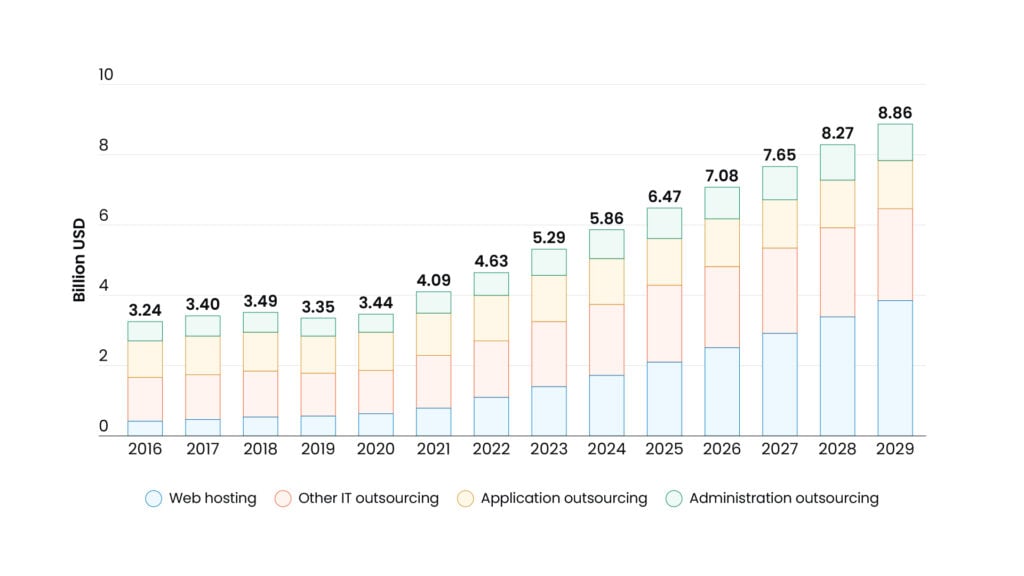 DE
DE- Industries
- Finance
Nearshore software development for finance—secure, scalable, and compliant solutions for banking, payments, and APIs.
- Retail
Retail software development services—e-commerce, POS, logistics, and AI-driven personalization from nearshore engineering teams.
- Manufacturing
Nearshore manufacturing software development—ERP systems, IoT platforms, and automation tools to optimize industrial operations.
- Finance
- What we do
- Services
- Software modernization services
- Cloud solutions
- AI – Artificial intelligence
- Idea validation & Product development services
- Digital solutions
- Integration for digital ecosystems
- A11y – Accessibility
- QA – Test development
- Technologies
- Front-end
- Back-end
- DevOps & CI/CD
- Cloud
- Mobile
- Collaboration models
- Collaboration models
Explore collaboration models customized to your specific needs: Complete nearshoring teams, Local heroes from partners with the nearshoring team, or Mixed tech teams with partners.
- Way of work
Through close collaboration with your business, we create customized solutions aligned with your specific requirements, resulting in sustainable outcomes.
- Collaboration models
- Services
- About Us
- Who we are
We are a full-service nearshoring provider for digital software products, uniquely positioned as a high-quality partner with native-speaking local experts, perfectly aligned with your business needs.
- Meet our team
ProductDock’s experienced team proficient in modern technologies and tools, boasts 15 years of successful projects, collaborating with prominent companies.
- Why nearshoring
Elevate your business efficiently with our premium full-service software development services that blend nearshore and local expertise to support you throughout your digital product journey.
- Who we are
- Our work
- Career
- Life at ProductDock
We’re all about fostering teamwork, creativity, and empowerment within our team of over 120 incredibly talented experts in modern technologies.
- Open positions
Do you enjoy working on exciting projects and feel rewarded when those efforts are successful? If so, we’d like you to join our team.
- Hiring guide
How we choose our crew members? We think of you as a member of our crew. We are happy to share our process with you!
- Rookie boot camp internship
Start your IT journey with Rookie boot camp, our paid internship program where students and graduates build skills, gain confidence, and get real-world experience.
- Life at ProductDock
- Newsroom
- News
Stay engaged with our most recent updates and releases, ensuring you are always up-to-date with the latest developments in the dynamic world of ProductDock.
- Events
Expand your expertise through networking with like-minded individuals and engaging in knowledge-sharing sessions at our upcoming events.
- News
- Blog
- Get in touch

17. Apr 2025 •6 minutes read
The role of nearshoring in retail software development: Benefits and best practices
ProductDock
Digital transformation is no longer optional for retail businesses, it’s a necessity. Swedish consumers expect a seamless online and in-store shopping experience. However, a persistent shortage of tech talent in Sweden makes it difficult for companies to implement modern solutions. To bridge this gap, this country has increasingly turned to outsourcing.
As a result, Sweden has become a key destination for international digital talent, and nearshoring has emerged as a crucial strategy across multiple industries, including retail.
In this article, we will explore the role of nearshoring in retail software development, as well as its benefits, challenges, and best practices for success.
Understanding nearshoring in retail software development
Nearshoring refers to outsourcing business processes or services to a nearby country, often within the same zone or region, which ensures seamless project management and communication. For example, a retailer based in Sweden can outsource development teams from countries like Serbia, Bosnia and Herzegovina, or Portugal.
Whether launching an e-commerce platform, upgrading a POS system, implementing payment gateways, or integrating AI-driven personalization, nearshoring enables retail companies to accelerate development cycles due to time zone alignment and a diverse pool of talent.
With approximately 80% of Swedish companies lacking sufficient IT support, nearshoring software development offers retailers the opportunity to continuously evolve and introduce innovative digital products that cater to changing customer preferences and market dynamics.

Source: Market study: The Swedish market for IT services, Open Trade Gate Sweden, October 2024
Benefits of nearshoring software development in retail
Rapid access to top-tier tech experts
With over seven million active online shoppers in Sweden, the e-commerce market is highly competitive. To stay ahead, retailers must innovate quickly, which requires an experienced team of developers. Nearshoring provides rapid access to top-tier tech experts, allowing retailers to tap into specialized software development talent in prime European tech hubs. Unlike traditional recruitment, which involves lengthy hiring and onboarding processes, nearshoring eliminates delays by providing teams ready to meet project demands immediately. This access enables retailers to accelerate product development cycles, launch new features faster and remain competitive in the fast-paced e-commerce landscape.
For example, Adevinta, a global specialist in online classifieds for general goods and verticalized for specialized areas like vehicles or real estate, partnered with a nearshore development team to optimize its end-to-end systems and enrich existing business areas. By leveraging nearshore expertise, Adevinta has not only accelerated time to market and ensured seamless performance, but also ensured continuous innovation, scalability, and efficiency in delivering business value.
“Our nearshore IT team managed the project efficiently, ensuring an effective workflow. Their linguistic flexibility and genuine interest were noteworthy. The outcomes and quality of the work were on par with those of our internal teams.”
Peter Laufer, Director of Engineering, Adevinta
High-quality and cost-effective retail digital products
In Sweden, the talent shortage has led to a 12% increase in software developer salaries since 2022. Nearshoring software development enables retailers to deliver highly personalized shopping experiences and forge stronger customer connections while maintaining cost-effectiveness. Nearshore countries often have lower operational costs, allowing Swedish retailers to leverage top-tier expertise at a fraction of the cost.
This balance of high-quality development and cost savings makes nearshoring a smart choice for retailers to stay competitive without overspending.
Shared values and cultural alignment
Thanks to cultural compatibility, nearshore teams are more likely to share your values and work ethic, making integration into your team smoother. This sense of alignment is particularly important for retail success. When your team shares your company’s values, they are better equipped to understand your customers and translate your mission and vision into your digital products. This shared understanding fosters stronger collaboration and ensures that the final solution aligns with your brand’s identity and goals.
“What I really appreciate is the strong collaboration and open communication between our team and the client. From the start, we had a clear understanding of their vision and challenges, which allowed us to work efficiently. This seamless teamwork was key to developing a complete solution for camera-free, hands-free checkout. I can confidently say that, beyond technical expertise, the alignment between the nearshore team and client played a crucial role in building a system that lets customers grab their items, walk through a checkout line, and have everything automatically scanned for an effortless one-step payment.”
Suzana Bogojević, an iOS developer working on the full solution for a hands-free checkout without camera tracking
The client’s team, working closely with Suzana and her colleagues, shared similar sentiments about the collaboration. They particularly appreciated the transparent communication, strong company culture and highly motivated team.
“Our nearshore team was very hands-on and highly motivated, consistently meeting deadlines. I was amazed at their agile mindset, company culture, and experience.”
Dr Nino Raddao, equity partner
Additionally, unlike offshoring, which involves outsourcing business operations to distant countries on other continents, nearshoring involves partnering with nearby countries that share similar regulatory frameworks. For example, when working with nearshore teams in Europe, they must comply with important regulations such as The General Data Protection Regulation (GDPR), the Cybersecurity Act and the Directive on Security of Network and Information Systems (NIS2). These regulations enforce strict data protection and cybersecurity measures.
This alignment with local and international regulations helps retailers ensure their business operations meet the required legal standards, reduce the risk of compliance issues and safeguard sensitive customer data.
Seamless real-time communication
In the retail industry, real-time communication with the development team is essential for ensuring a seamless shopping experience. Issues like website downtime, payment gateway errors or inventory discrepancies can frustrate customers and lead to lost sales. Immediate response and bug resolution are crucial in maintaining customer trust and business continuity.
Thanks to overlapping business hours, nearshoring teams can function as an extension of your company, addressing issues in real-time and minimizing disruptions. You can seamlessly communicate with your nearshore team through platforms like Zoom, Teams and emails without delays caused by time zone differences.
Additionally, geographical proximity makes visiting your nearshore in person cost-effective and time-efficient. For example, if you are in Sweden and your nearshore team is in Serbia or Bosnia and Herzegovina, a flight would take around two hours. These visits strengthen team spirit and collaboration.
Best strategies for successful nearshoring in Sweden’s retail industry
Partner with mixed tech teams
In retail, success depends not only on the strong technical expertise of your team but also on their deep understanding of your market and customers. Select a nearshore vendor that offers mixed tech teams, combining local and remote professionals. This balance ensures your digital product is both technically robust and aligned with consumer expectations.
Choose proven expertise in retail software development
Partner with a nearshore team that has a strong track record in the retail industry. Look for experience in developing and optimizing e-commerce platforms, POS systems, inventory management software, demand forecasting tools, and omnichannel retail solutions. A team with deep industry knowledge will understand the complexities of retail operations, ensuring your digital infrastructure meets industry standards, improves customer experience and supports business growth.
Prioritize experience in nearshoring
Choosing a software development partner with extensive experience in nearshoring is crucial in the retail industry. Look for a company with clear operational processes, client testimonials, and a strong service portfolio that can help verify its credibility. An experienced nearshore team will have established workflows, minimizing risks and ensuring seamless collaboration.
A great example of how an experienced nearshore team with clear procedures can enhance a retail business is the case of a multinational fashion retailer operating brick-and-mortar stores across 18 European countries, alongside a growing e-commerce platform. Partnering with a nearshore development team, the company implemented the MuleSoft Anypoint Platform as its central integration layer for all interfaces within the company. As business needs evolved, the demand for new integrations grew, pushing the company to expand the MuleSoft capabilities. What they valued most about their nearshore team was its lean and flexible project management style. The team adapted seamlessly whenever needed and effectively utilized several communication tools, such as MS Teams, Jira and Confluence.
Ensure ethical business practices
Ensure your IT vendor aligns with your ethical standards. Swedish retail companies uphold high standards of business ethics, so nearshore teams must demonstrate strong governance and an ethical business model. Look for recognized certifications of ethical and legal compliance to ensure credibility.
Key takeaways
Nearshoring software development offers Swedish retailers a strategic advantage in addressing talent shortages, lowering IT costs, and driving continuous innovation in an increasingly competitive market.
Investing in technologies such as AI personalization tools, demand forecasting, automated inventory management, smart checkout systems, and fraud detection will be crucial for driving business growth.
With Sweden’s software development market projected to grow at an annual rate of 4.01% from 2025 to 2029, resulting in a market volume of US$7.08bn by 2029, retail companies could prioritize nearshoring to stay ahead.
However, if Swedish retailers want to fully leverage these benefits, they must prioritize clear communication, implement strong security protocols, and carefully select nearshore vendors.
By following these best practices, retailers can navigate the evolving digital landscape and maintain a competitive edge.



